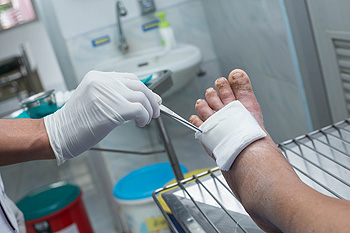
You don't need an excuse to have beautiful nails. Step outside without worrying about the appearance of your feet.

As a shock absorber and support mechanism to the arch, the connective tissue known as the plantar fascia, is under a lot of pressure. Certain factors like obesity, improper footwear, age, stress from athletic activities, or irregular foot mechanics can compound this stress and cause the plantar fascia to become damaged or even torn. This condition is known as plantar fasciitis—the most common cause of heel pain. This stabbing pain is usually most severe in the mornings when the plantar fascia has stiffened overnight from lack of use. The pain typically subsides as you begin to use your feet again when walking or moving around, only to return later in the day. Plantar fasciitis can also make your arch and toes sore. There are many effective conservative treatments for plantar fasciitis that your podiatrist can use to eliminate pain and repair your plantar fascia. Make an appointment with a podiatrist today to get relief from heel pain.
Plantar fasciitis can be very painful and inconvenient. If you are experiencing heel pain or symptoms of plantar fasciitis, contact Dr. Alexander Terris from Total Foot Care. Our doctor can provide the care you need to keep you pain-free and on your feet.
What Is Plantar Fasciitis?
Plantar fasciitis is the inflammation of the thick band of tissue that runs along the bottom of your foot, known as the plantar fascia, and causes mild to severe heel pain.
What Causes Plantar Fasciitis?
How Can It Be Treated?
While very treatable, plantar fasciitis is definitely not something that should be ignored. Especially in severe cases, speaking to your doctor right away is highly recommended to avoid complications and severe heel pain. Your podiatrist can work with you to provide the appropriate treatment options tailored to your condition.
If you have any questions please feel free to contact our office located in Wilmington, DE . We offer the newest diagnostic and treatment technologies for all your foot and ankle needs.
 People with diabetes often develop peripheral neuropathy, caused by damaged nerves that make the feet numb. This condition often results in the inability of the diabetic to feel pain in the foot or toes. Cuts and sores that go unnoticed can take a long time to heal and eventually form into ulcers. When this happens, the health of the diabetic is at risk, as the ulcers can lead to gangrene or even limb loss in extreme cases. One way to treat the ulcers is with a total contact cast which is designed to protect the skin by placing a layer of foam between the foot and the plastic shell of the cast. As a result, the pressure is taken off the ulcer and gives it a chance to heal. This process can take up to 8 weeks. If you have neuropathy and notice sores on your feet that are not healing, it is suggested that you make an appointment with a podiatrist who can examine your feet and offer treatment options.
People with diabetes often develop peripheral neuropathy, caused by damaged nerves that make the feet numb. This condition often results in the inability of the diabetic to feel pain in the foot or toes. Cuts and sores that go unnoticed can take a long time to heal and eventually form into ulcers. When this happens, the health of the diabetic is at risk, as the ulcers can lead to gangrene or even limb loss in extreme cases. One way to treat the ulcers is with a total contact cast which is designed to protect the skin by placing a layer of foam between the foot and the plastic shell of the cast. As a result, the pressure is taken off the ulcer and gives it a chance to heal. This process can take up to 8 weeks. If you have neuropathy and notice sores on your feet that are not healing, it is suggested that you make an appointment with a podiatrist who can examine your feet and offer treatment options.
Diabetic foot care is important in preventing foot ailments such as ulcers. If you are suffering from diabetes or have any other concerns about your feet, contact Dr. Alexander Terris from Total Foot Care. Our doctor can provide the care you need to keep you pain-free and on your feet.
Diabetic Foot Care
Diabetes affects millions of people every year. The condition can damage blood vessels in many parts of the body, especially the feet. Because of this, taking care of your feet is essential if you have diabetes, and having a podiatrist help monitor your foot health is highly recommended.
The Importance of Caring for Your Feet
Patients with diabetes should have their doctor monitor their blood levels, as blood sugar levels play such a huge role in diabetic care. Monitoring these levels on a regular basis is highly advised.
It is always best to inform your healthcare professional of any concerns you may have regarding your feet, especially for diabetic patients. Early treatment and routine foot examinations are keys to maintaining proper health, especially because severe complications can arise if proper treatment is not applied.
If you have any questions please feel free to contact our office located in Wilmington, DE . We offer the newest diagnostic and treatment technologies for all your foot and ankle needs.
Read more about Diabetic Foot Care
You probably have an ingrown toenail if the side of your toe turns red and sore and begins to swell. The main cause of this condition is that the nail pushes into the skin surrounding it and takes hold. One cause is wearing shoes that fit improperly, allowing little room in the toe box for your toes to move. Another cause is cutting toenails improperly. Nails that are rounded or trimmed down at the corners are at risk of becoming ingrown. The first way to avoid ingrown toenails is to cut your nails straight across. Second, try not to pick at your toenails or tear them off at the corners. Third, avoid wearing high heels with pointy toes and shoes that constrict your feet. If the affected toe swells and becomes filled with fluid or pus, it is likely infected. It is a good idea to seek immediate help from a podiatrist who can drain the area and treat it properly. If recurring ingrown toenails are a problem, it may be wise to make regular foot care appointments.
Ingrown toenails can become painful if they are not treated properly. For more information about ingrown toenails, contact Dr. Alexander Terris of Total Foot Care. Our doctor can provide the care you need to keep you pain-free and on your feet.
Ingrown Toenails
Ingrown toenails occur when a toenail grows sideways into the bed of the nail, causing pain, swelling, and possibly infection.
Causes
Prevention
Because ingrown toenails are not something found outside of shoe-wearing cultures, going barefoot as often as possible will decrease the likeliness of developing ingrown toenails. Wearing proper fitting shoes and using proper cutting techniques will also help decrease your risk of developing ingrown toenails.
Treatment
Ingrown toenails are a very treatable foot condition. In minor cases, soaking the affected area in salt or antibacterial soaps will not only help with the ingrown nail itself, but also help prevent any infections from occurring. In more severe cases, surgery is an option. In either case, speaking to your podiatrist about this condition will help you get a better understanding of specific treatment options that are right for you.
If you have any questions please feel free to contact our office located in Wilmington, DE . We offer the newest diagnostic and treatment technologies for all your foot and ankle needs.
Read more about Ingrown Toenail Care
Do you suffer from heel pain when you get up in the morning? If so, you should seek the professional help of your podiatrist and have a proper diagnosis performed. Heel pain can be caused by several different foot-related conditions.

Adults often experience the onset of foot conditions more and more as they age. Just like the tires on a car, the feet simply begin to wear down. It is thought that the average senior puts about 115,000 miles on their feet over a lifetime. If foot problems are taking a more prominent role in your life, there are some ways to help prevent them from getting worse. Check to see if you need different shoes, because feet tend to widen as you age. Shoes with good support can also help prevent falls. It may also be time to give up high heels and pointy-toed shoes which often cause bunions, hammertoes, corns, and other foot ailments over time. The wearing away of the natural fat pads on the heel and ball of the foot may indicate a need for shoe inserts or orthotics to help cushion your feet. If standing or walking is becoming difficult, implementing the use of a walker, walking stick, or cane may help to prevent loss of balance and falls. Finally, it is a good idea to make regular appointments with a podiatrist to make sure your feet are receiving the proper care they need.
Proper foot care is something many older adults forget to consider. If you have any concerns about your feet and ankles, contact Dr. Alexander Terris from Total Foot Care. Our doctor can provide the care you need to keep you pain-free and on your feet.
The Elderly and Their Feet
As we age we start to notice many changes in our body, but the elder population may not notice them right away. Medical conditions may prevent the elderly to take notice of their foot health right away. Poor vision is a lead contributor to not taking action for the elderly.
Common Conditions
Susceptible Infections
Diabetes and poor circulation can cause general loss of sensitivity over the years, turning a simple cut into a serious issue.
If you have any questions please feel free to contact our office located in Wilmington, DE . We offer the newest diagnostic and treatment technologies for all your foot and ankle needs.
Read more about Taking Care of Elderly Feet